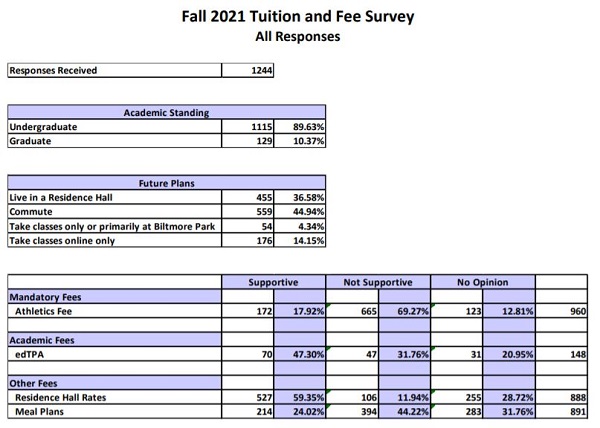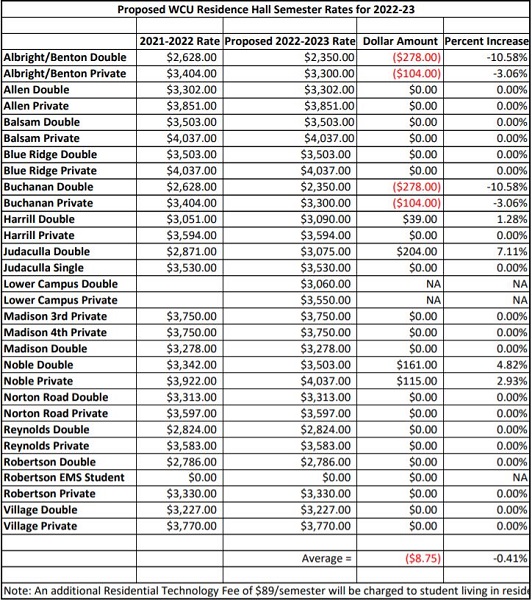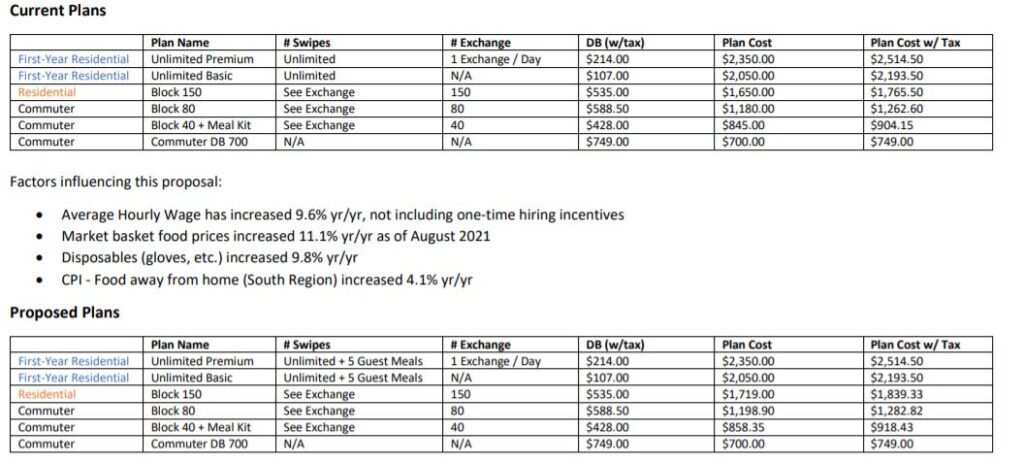Story co-written/produced with Nick Childs
WCU students might see increases in the bills for their school in the Fall 2022. Last semester the Board of Trustees approved increases in athletics fees, meal plan rates, residential room rates and introduced a CEAP Teacher Education Course fees for students in that program. Only the athletics fee and the CEAP Teacher Education Course fee, which is only for a certain major, await approval from the UNC Board of Governors, said Dr. Sam Miller, co-chair of the Tuition and Fee Committee.
In a survey conducted by the Tuition and Fee Committee, roughly 69% of the 1244 respondents disapprove of the changes. Many students feel the fees are unnecessary, especially the athletics fee. In two separate informal surveys conducted by the Western Carolina Journalist, 105 students weighed in on whether or not they were aware of the changes prior to their approval. A majority of the students we talked to (66) said they were unaware of the fees change, 14 said they were only somewhat aware of the fees, and 26 said they were aware of the proposed changes.

Some of the students who responded to the WCJ’s surveys indicated confusion over the fees and that the school should better communicate changes with students. Students believe the school should flag emails relating to changes or be clearer when communicating them instead of burying them in the middle of emails many students assume are unimportant.
Proposed Changes
The most controversial of the fee changes is the athletics. Currently the athletics fee is $782 annually. The proposed changes will result in a $86 or an 11% increase yearly, or $43 per semester. This would bring the athletics fee up to $868 per year. (see video below for more and why)
This proposed increase is to improve outdated, deteriorating facilities and get the stadium more accessible for individuals with disabilities. It is also to improve coaching areas, the press box and student athlete facilities.
The CEAP teacher education course fee is the other fee that must be accepted by the UNC Board of Governors. The course fee, which only effects students in a particular course, had been covered by the college but is now falling on the students. The reason for this is because the fee is unsustainable for the college. The fee will increase from $150 to $450.
The residential hall rates have an overall decrease of $8.75 or 0.41% from last year’s semester rates, though some residential halls are increasing. Residential halls that are going up in price are Harrill, Judaculla and Noble. In contrast, some residential halls are going down in price to balance the difference. These include, Albright-Benton and Buchanan. The remainder of the rates will be unchanged.

The change in the rates is a direct result of new halls under construction and establishing a new baseline for rates based on amenities provided in the newer dorms such as Noble and Judaculla, as explained by Hart in an email.
Optional meal plans for students are also changing in price. The meal plans impacted are the residential 150 block meal plan and the block 80 and block 40, which are for commuters. The changes average a 1.19% increase across all plans. NC sales tax is added to the cost of the meal plans on the WCU tuition and fee bills.

According to a presentation provided by Robert Walker, Director of Auxiliary Services, the reasons for these increases are because of record inflation, including Market Basket food prices increasing by 11.1% a year as of August 2021 and disposables (gloves, etc.) which increased 9.8% a year. The rate increases are also a response to an average hourly wage increase of 9.6% a year, not including the one-time hiring incentives.
For the third year in a row, there has not been an increase on mandatory first year meal plans. This is one of Walker’s main goals.
“It’s important to us that people coming in with required meal plans, that we keep that price as low as we can,” said Walker.
Dr. Miller stressed the importance of making smart financial decisions while taking the impact on student debt into consideration.
“The future depends on us making smart financial choices now and we always look at balancing what the fees are being requested for with the impact those fees or charges will have on students and student debt,” said Miller.
The WCU Tuition and Fee Committee is responsible under the UNC System policy with reviewing tuition and fee proposals, student financial aid information, UNC System information and receiving student input on proposed increases.
The committee represents Faculty Senate and Staff Senate and is co-chaired by the SGA President, Rebecca Hart, and the vice chancellor of Student Affairs, Dr. Sam Miller. Up to three other students can join the committee and are appointed by the SGA president.
Proposed fees must go through a process that takes several months to be approved. According to Hart, institutions receive guidance every year from the school system regarding what fees can or should be up for consideration. Departments, programs, etc. then bring their proposed fee changes to the Tuition and Fees Committee. The committee hears the reasoning for the proposed fee changes and any additional information.
The department of Student Affairs at WCU then hosts two public forums and puts out a survey in an effort to inform students of the proposed changes and get student feedback. The committee views the survey results and discusses recommendations concerning the proposed changes.
From the Tuition and Fees Committee, the recommendations go to the chancellor, who makes more recommendations before sending the proposals to the Board of Trustees. The Board of Governors then makes a final decision on whether or not to implement the fees, said Dr. Miller.
The SGA Senate also hears a presentation on the proposed changes from Dr. Sam Miller, co-chair of the committee and vice chancellor of student affairs. The student body president also gets a say on the proposals when they are presented to the Board of Trustees since the president acts as a voting member, according to Hart.


